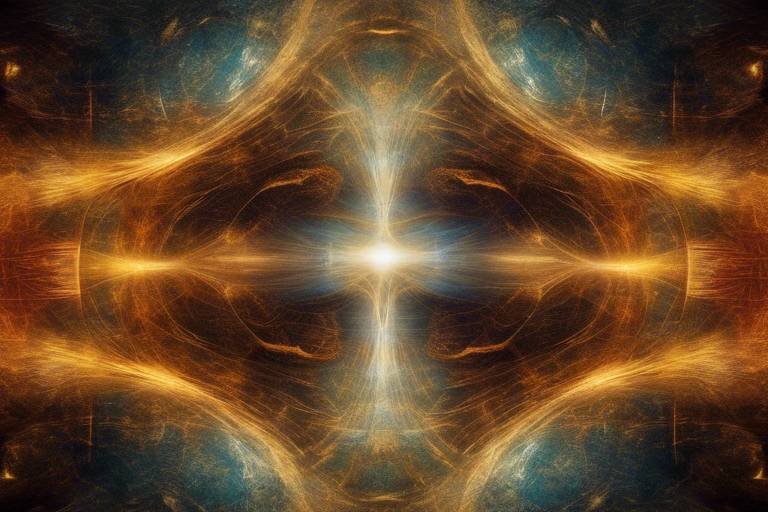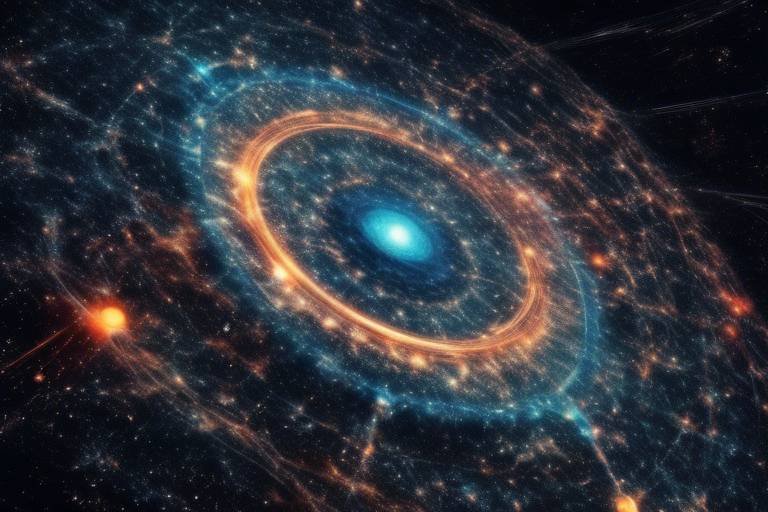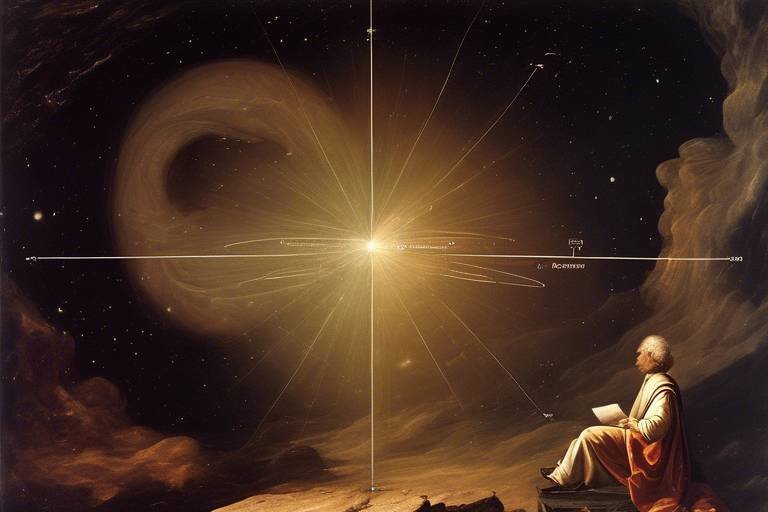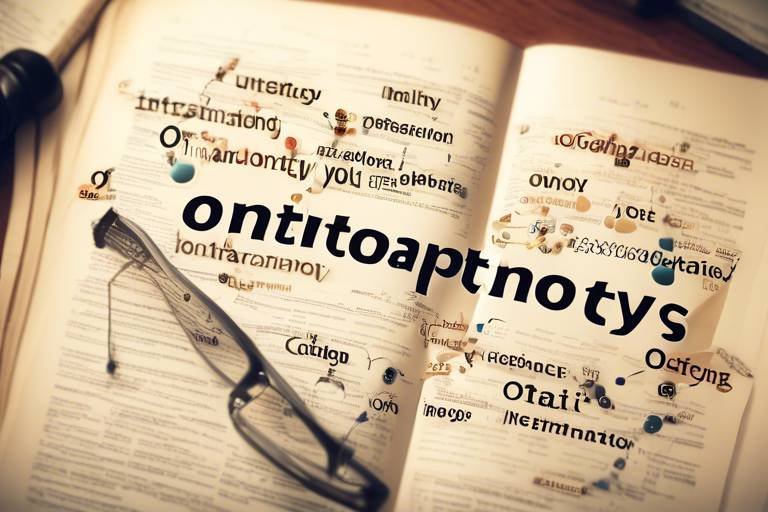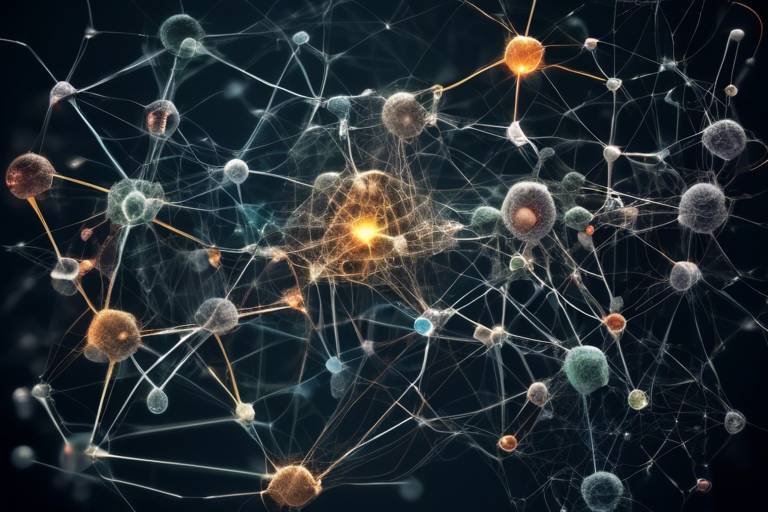Does Ontology Hold the Key to Understanding Existence?
When we ponder the question of existence, we often find ourselves diving into the deep waters of philosophy, where ontology reigns supreme. But what exactly is ontology? In the simplest terms, it is the study of being, existence, and the nature of reality. Imagine trying to unravel the mysteries of a complex tapestry; each thread represents a different aspect of existence, and ontology helps us understand how these threads interweave to create the fabric of reality as we know it.
Ontology holds a significant place in philosophy, not just as an abstract concept, but as a crucial lens through which we can examine our very existence. It invites us to ask profound questions: What does it mean to be? What is the essence of existence? Is there a difference between what something is and that it is? These inquiries are not just academic; they resonate deeply within our daily lives, influencing how we perceive ourselves and the world around us.
As we journey through this exploration of ontology, we'll uncover its historical roots, from the ancient philosophers like Aristotle to modern thinkers who challenge our understanding of reality. We'll also delve into the intersection of ontology and science, revealing how groundbreaking discoveries in quantum mechanics and biology reshape our perceptions of existence. So, buckle up as we embark on this intellectual adventure, seeking to understand whether ontology truly holds the key to unlocking the mysteries of existence.
Ontology is not just a dry academic term; it is a vibrant field of inquiry that addresses fundamental questions about the nature of reality. At its core, ontology investigates what it means to exist. It examines categories of being and their relationships, providing a framework for understanding the complexities of existence.
Historically, ontology has evolved significantly, influenced by various philosophical movements and cultural contexts. The roots of ontology can be traced back to ancient Greece, where philosophers like Plato and Aristotle laid the groundwork for future discussions. Their works introduced key concepts such as substance, essence, and categories, which continue to inform contemporary philosophical debates.
Understanding the historical development of ontology is essential for grasping its significance today. Throughout history, thinkers have grappled with the nature of existence, each contributing unique insights that have shaped our current understanding. From the metaphysical inquiries of the early philosophers to the existential ponderings of modern thinkers, the evolution of ontology reflects humanity's quest for meaning.
Aristotle's contributions to ontology are monumental, establishing a foundation that resonates through the ages. His exploration of substance and essence introduced a systematic approach to understanding existence. Aristotle distinguished between what a thing is (its essence) and that it is (its existence), a differentiation that remains pivotal in philosophical discussions. This distinction invites us to consider not just the physical attributes of objects but also their underlying nature.
The debate between essence and existence is a cornerstone of ontological inquiry. Different philosophers have interpreted this relationship in various ways, leading to rich discussions about the nature of being. For instance, existentialists argue that existence precedes essence, suggesting that individuals define their own meaning through their actions and choices. In contrast, essentialists maintain that certain inherent characteristics define what it means to be. This tension between essence and existence continues to provoke thought and discussion in contemporary philosophy.
Substance theory, a key component of Aristotelian ontology, examines the nature of substances and their properties. Aristotle posited that substances are the fundamental realities that make up the world. They possess attributes that distinguish them from one another and contribute to their identity. This theory prompts us to consider how substances relate to existence and what it means for something to be a distinct entity.
As we move into the modern era, ontological theories have expanded to include existentialism and phenomenology, which offer fresh perspectives on existence and the human condition. Existentialist thinkers like Jean-Paul Sartre and Martin Heidegger challenge traditional notions of being, emphasizing the individual's experience and the subjective nature of reality. Phenomenology, on the other hand, focuses on the structures of experience and consciousness, shedding light on how we perceive existence.
The intersection of ontology and science unveils fascinating insights into our understanding of existence. Scientific discoveries, particularly in fields like quantum mechanics, have profound implications for ontological theories. For instance, quantum ontology challenges conventional notions of reality, suggesting that at the subatomic level, existence is not as straightforward as it seems. This invites philosophical debates about the nature of reality itself.
Quantum mechanics has introduced a paradigm shift in our understanding of existence. The behavior of subatomic particles defies traditional logic, leading to questions about the nature of reality. Are particles real, or are they merely probabilities? This uncertainty challenges our ontological frameworks, prompting us to reconsider what it means for something to exist.
Biological ontology explores the nature of life and living beings, examining how biological concepts influence our understanding of existence. This branch of ontology delves into questions about identity, essence, and the fundamental characteristics that define living organisms. Understanding biological ontology helps us grasp the complexities of life and our place within it.
Ontology's relevance extends far beyond philosophical discourse; it permeates our everyday lives, shaping our understanding of identity, relationships, and reality. The questions we ask about existence influence how we perceive ourselves and our interactions with others. For instance, when we consider our identity, we often grapple with the essence of who we are versus the roles we play in society.
In conclusion, ontology serves as a vital key to unlocking the mysteries of existence. By exploring its historical roots, modern theories, and implications in science and everyday life, we gain a richer understanding of what it means to be. As we continue to ponder these questions, we invite you to reflect on your own beliefs about existence and the nature of reality.
- What is ontology? Ontology is the philosophical study of being, existence, and the nature of reality.
- How does ontology relate to science? Ontology intersects with science by examining how scientific discoveries influence our understanding of existence.
- Why is the distinction between essence and existence important? This distinction helps us understand the fundamental nature of entities and their identities.
- What are some modern ontological theories? Modern theories include existentialism and phenomenology, which focus on subjective experiences and the nature of being.

The Basics of Ontology
Ontology is a fundamental branch of philosophy that delves into the essence of being and existence. At its core, ontology seeks to answer profound questions such as: What does it mean to exist? What is the nature of reality? These inquiries are not just academic; they resonate with our everyday experiences and shape our understanding of the world around us. By examining the core concepts of ontology, we can gain a clearer perspective on how we categorize and interpret our existence.
One of the primary aims of ontology is to classify entities and explore their relationships. This involves understanding different categories of being, which can include:
- Physical entities: Objects that occupy space and have mass.
- Abstract entities: Concepts, ideas, or properties that do not have a physical presence.
- Social entities: Groups, institutions, and relationships that exist within a societal context.
Historically, ontology has evolved significantly, influenced by various philosophical traditions. It is essential to recognize that ontology is not a monolithic discipline; rather, it encompasses a variety of perspectives. For instance, the ancient Greeks laid the groundwork for ontological discussions, while medieval philosophers expanded these ideas within a theological framework. In modern times, thinkers have challenged traditional ontological views, leading to a rich tapestry of theories and debates.
One of the key concepts in ontology is the distinction between essence and existence. Essence refers to the fundamental nature or characteristics that define an entity, while existence pertains to the state of being or the actual presence of that entity in reality. This distinction has been pivotal in shaping philosophical discourse, as it raises questions about whether existence is a prerequisite for essence or if essence can exist independently of an entity's physical manifestation.
Another important aspect of ontology is substance theory, which posits that substances are the fundamental building blocks of reality. According to this theory, substances possess properties and can undergo changes while maintaining their identity. This idea has significant implications for our understanding of existence, as it suggests that the properties of an entity can influence its essence and, consequently, its role in the broader context of reality.
In summary, ontology serves as a crucial framework for exploring the nature of existence and reality. By examining its core concepts and historical developments, we can better appreciate the complexities of being and the myriad ways in which philosophers have sought to understand it. As we delve deeper into the subject, we will uncover how these ideas have evolved and how they continue to influence contemporary thought.

Historical Perspectives on Ontology
Understanding the evolution of ontology is like tracing a rich tapestry woven from the thoughts and ideas of some of the greatest minds in philosophy. From the ancient Greeks to modern thinkers, each philosopher has contributed unique threads that help us comprehend the complex nature of existence. In this exploration, we will delve into the pivotal figures who have shaped ontological thought, their groundbreaking ideas, and how these concepts continue to influence our understanding of reality today.
One of the most significant periods in the history of ontology is undoubtedly the time of the ancient Greeks. Here, we find the likes of Plato and Aristotle, whose ideas laid the foundation for much of Western philosophy. Plato introduced the concept of the World of Forms, suggesting that the material world is merely a shadow of a more perfect, abstract reality. His allegory of the cave illustrates this idea brilliantly, portraying prisoners who can only see shadows on a wall, unaware of the true forms that cast those shadows. This notion raises essential questions about the nature of reality and existence—are we merely observing a reflection of something more profound?
Aristotle, on the other hand, took a more empirical approach. He rejected Plato’s theory of forms, arguing instead that the essence of a thing is found within the thing itself. Aristotle’s ontology is centered around the idea of substance, which he defined as that which exists independently. His work on categorization, particularly in his text "Categories," outlines how different entities can be classified and understood in relation to their existence. This foundational work has had a lasting impact on how we perceive the world around us, influencing not just philosophy but also the sciences.
As we journey through history, we encounter other notable philosophers who further enriched ontological discourse. The medieval period introduced figures like Thomas Aquinas, who integrated Aristotelian thought with Christian theology. Aquinas's exploration of being and existence led to the famous distinction between essence and existence. He argued that for created beings, essence does not imply existence; rather, existence is granted by God. This perspective opened up new avenues for understanding the relationship between the divine and the material world.
Fast forward to the 20th century, and we find ourselves amidst a whirlwind of existential thought. Philosophers like Martin Heidegger and Jean-Paul Sartre challenged traditional ontological views by focusing on human existence and experience. Heidegger’s concept of Dasein emphasizes the importance of being-in-the-world, suggesting that understanding existence requires an examination of our lived experiences. Sartre, a proponent of existentialism, famously declared that “existence precedes essence,” positing that individuals are not defined by any predetermined nature but rather by their choices and actions. This radical view has reshaped how we think about personal identity and the nature of reality.
In addition to these philosophical giants, the 20th century also saw the rise of analytic philosophy, which brought a new level of precision to ontological discussions. Thinkers like Willard Van Orman Quine challenged the notion of a clear distinction between ontology and epistemology, arguing that our understanding of existence is deeply intertwined with our knowledge and language. This perspective has profound implications for how we construct our understanding of reality.
As we reflect on these historical perspectives, it becomes evident that ontology is not just a static field of study; it is a dynamic and evolving discourse that continues to shape our understanding of existence. Each philosopher has contributed to a larger conversation about what it means to exist, and their ideas resonate in contemporary discussions about reality, identity, and the nature of being.
- What is ontology? Ontology is the branch of philosophy that studies the nature of being, existence, and reality.
- Who are some key figures in the history of ontology? Key figures include Plato, Aristotle, Thomas Aquinas, Martin Heidegger, and Jean-Paul Sartre, among others.
- How does ontology relate to other fields? Ontology intersects with various disciplines, including science, linguistics, and theology, influencing our understanding of existence and reality.

Aristotelian Ontology
Aristotelian ontology is nothing short of a cornerstone in the vast landscape of Western philosophy. Aristotle, a towering figure in the realm of thought, introduced concepts that have profoundly shaped our understanding of existence. To grasp the intricacies of his ontology, we must first dive into his definitions of substance, essence, and categories. For Aristotle, substances are the fundamental realities that exist independently; they are the things that are. This notion leads us to consider the essence of these substances, which refers to what a thing is at its core. In contrast, existence pertains to whether a thing is present in the world. This distinction is crucial, as it lays the groundwork for many philosophical debates that continue to this day.
Aristotle categorized substances into two main types: primary substances, which are individual entities like a specific person or animal, and secondary substances, which are the species or genera to which those individuals belong. This duality helps us understand the complexity of existence—while a particular cat (a primary substance) exists, the concept of 'cat' as a species (a secondary substance) also holds significance in our understanding of reality.
Moreover, Aristotle's exploration of categories provides a framework for discussing how different entities relate to one another. He proposed ten categories that encompass various aspects of being, including quantity, quality, relation, and place. These categories serve as a lens through which we can analyze and categorize the world around us, offering a systematic approach to ontology that remains relevant in modern philosophical discourse.
In essence, Aristotelian ontology invites us to ponder profound questions: What does it mean to exist? How do we differentiate between the essence of a thing and its existence? By engaging with these questions, we not only deepen our understanding of reality but also enrich our everyday experiences. For instance, when we consider the essence of friendship, we might explore qualities such as trust and loyalty, ultimately leading us to a richer appreciation of our relationships.
As we navigate through the implications of Aristotelian ontology, it's fascinating to see how these ancient ideas resonate with contemporary thought. The ongoing dialogue between Aristotle's concepts and modern philosophical inquiries illustrates the timeless nature of these discussions. In this light, we can appreciate how Aristotle's ontology serves as a bridge connecting past and present, prompting us to reflect on our own existence and the nature of being.

Essence vs. Existence
When diving into the depths of ontology, one of the most intriguing and debated concepts is the distinction between essence and existence. At its core, essence refers to what something is, the fundamental qualities that define its nature. On the other hand, existence pertains to the state of being, the fact that something is present or real. This distinction is not merely academic; it has profound implications for our understanding of reality and our place within it.
Philosophers throughout history have grappled with this dichotomy, leading to various interpretations and theories. For instance, Aristotle posited that essence precedes existence. In his view, a thing's essence—its defining characteristics—must be established before we can even talk about its existence. This perspective suggests that understanding the intrinsic nature of an object or being is crucial to comprehending its presence in the universe.
In contrast, existentialist thinkers like Jean-Paul Sartre flipped this idea on its head, arguing that for humans, existence comes first. According to Sartre, we exist first and then define ourselves through our actions and choices. This emphasis on existence as a precursor to essence radically shifts the focus from a predetermined nature to the freedom of individual agency. What a fascinating tension this creates! It’s like comparing a sculptor who chisels away at marble to reveal a statue versus one who starts with a blank canvas, allowing the image to emerge organically.
Consider the following table that summarizes the fundamental differences between essence and existence:
| Aspect | Essence | Existence |
|---|---|---|
| Definition | Fundamental nature or quality of a being | The state of being present or real |
| Philosophical View | Often seen as prior to existence (Aristotelian view) | Seen as primary, especially in existentialism (Sartre) |
| Implications | Understanding essence can lead to understanding existence | Emphasizes personal freedom and self-definition |
This ongoing dialogue between essence and existence can be likened to a dance, where each partner influences the other's movements. The essence of a being might shape its existence, while the experiences of existence can redefine its essence. Such interplay raises compelling questions: Are we born with a predetermined essence, or do we create our own through the choices we make? How does our understanding of essence impact our relationships and our interactions with the world around us?
By exploring these questions, we can gain deeper insights into our own lives and the nature of reality itself. The essence versus existence debate not only enriches philosophical discourse but also invites us to reflect on our identities and the very fabric of our being. In a world where understanding ourselves is paramount, this philosophical inquiry becomes not just a theoretical exercise but a practical guide for navigating life.

Substance Theory
Substance theory is a cornerstone of Aristotelian ontology, providing a framework for understanding the nature of reality and existence. At its core, substance theory posits that substances are the fundamental entities that make up the world around us. But what exactly does this mean? Imagine a house: it is made up of bricks, wood, and glass, but the house itself is more than just the sum of its parts. Similarly, substances in ontology are seen as the underlying realities that give rise to properties and phenomena.
Aristotle famously distinguished between two types of substances: primary substances and secondary substances. Primary substances refer to individual entities, such as a specific tree or a particular person, while secondary substances are the species or genera to which these individuals belong. This distinction is crucial because it helps us understand how individual entities relate to broader categories and concepts. For instance, when we think of a specific dog, we can also think about what it means to be a dog in general. This interplay between individual and category is vital in grasping the essence of existence.
In substance theory, each substance is characterized by its properties, which can be either essential or accidental. Essential properties are those that define what a substance is, while accidental properties are traits that a substance may possess but are not necessary for its identity. For example, the color of a car is an accidental property; it could be red, blue, or green, but regardless of its color, it remains a car. This distinction emphasizes the idea that substances maintain their identity even as their accidental properties change.
Furthermore, substance theory raises intriguing questions about identity and change. If a substance can undergo changes in its properties while retaining its essence, what does this imply about the nature of existence? This leads to a deeper exploration of how we define identity over time. For example, consider the classic thought experiment known as the "Ship of Theseus." If every part of a ship is replaced over time, is it still the same ship? Substance theory encourages us to delve into these philosophical dilemmas, prompting us to reflect on the very nature of reality.
To illustrate the complexities of substance theory, let's consider a table that summarizes the key aspects:
| Type of Substance | Description |
|---|---|
| Primary Substance | Individual entities that exist independently, such as a specific person or object. |
| Secondary Substance | Categories or species to which primary substances belong, like 'dog' or 'tree.' |
| Essential Properties | Attributes that define the identity of a substance. |
| Accidental Properties | Traits that do not affect the fundamental nature of a substance. |
In conclusion, substance theory is not just an abstract philosophical concept; it has profound implications for how we understand the world and our place within it. By examining the nature of substances, their properties, and their identities, we gain valuable insights into the complexities of existence. It invites us to ponder deeper questions about reality, encouraging a richer engagement with the world around us.
- What is substance theory? Substance theory is a philosophical framework that examines the nature of substances, their properties, and their relationships to existence.
- How does substance theory relate to identity? Substance theory explores how individual entities maintain their identity through essential properties, even as their accidental properties change.
- What are primary and secondary substances? Primary substances are individual entities, while secondary substances refer to the categories or species to which they belong.

Modern Ontological Theories
In the ever-evolving landscape of philosophy, have emerged as critical frameworks for understanding existence and the human condition. These theories often diverge from traditional perspectives, challenging established notions and inviting fresh interpretations of what it means to exist. Two prominent movements in modern ontology are existentialism and phenomenology, each offering unique insights into the nature of being.
Existentialism, championed by thinkers like Jean-Paul Sartre and Martin Heidegger, emphasizes individual experience and the inherent freedom of choice. It posits that existence precedes essence, suggesting that individuals are not defined by predetermined categories or labels. Instead, we create our essence through our actions and decisions. This perspective raises profound questions about authenticity and the search for meaning in a seemingly indifferent universe. For instance, Sartre famously stated, "Man is condemned to be free," highlighting the weight of responsibility that comes with our freedom to choose.
On the other hand, phenomenology, primarily associated with Edmund Husserl and later developed by Maurice Merleau-Ponty, focuses on the structures of experience and consciousness. It seeks to understand how we perceive and interpret the world around us. By examining the first-person perspective, phenomenologists argue that reality is shaped by our experiences and perceptions, making it inherently subjective. This approach invites us to consider how our lived experiences influence our understanding of existence, thus intertwining the observer with the observed.
These modern theories also intersect with various disciplines, including psychology and cognitive science. For instance, phenomenological methods have been adopted to explore human consciousness, leading to insights about how our mental states affect our perception of reality. Similarly, existential themes have found their way into therapy practices, helping individuals confront their freedom and responsibilities in a meaningful way.
As we delve deeper into these modern ontological theories, it's essential to recognize their implications for our daily lives. They challenge us to reflect on our choices and the narratives we construct about ourselves. Moreover, they encourage a dialogue about the nature of existence that transcends mere academic inquiry, inviting us to engage with our own experiences and the world around us.
In summary, modern ontological theories like existentialism and phenomenology provide profound insights into the human experience. They compel us to question the essence of our existence and emphasize the importance of personal experience in shaping our understanding of reality. As we navigate the complexities of life, these frameworks serve as valuable tools for exploring the intricacies of being.
- What is ontology? Ontology is a branch of philosophy that studies the nature of being, existence, and reality.
- How does existentialism differ from phenomenology? Existentialism focuses on individual choice and freedom, while phenomenology emphasizes the structures of experience and perception.
- Why is ontology important in modern philosophy? Ontology helps us understand fundamental questions about existence, identity, and the nature of reality, which are essential for both philosophical inquiry and practical life.

Ontology and Science
When we think about ontology, we often picture abstract concepts and philosophical debates, but its implications stretch far beyond the realm of philosophy and seep into the fabric of scientific inquiry. Ontology is not just a theoretical framework; it is a lens through which we can examine the very nature of existence, especially in the context of modern scientific advancements. The intersection of ontology and science raises intriguing questions: How does our understanding of existence change with new scientific discoveries? What does it mean for something to 'exist' in a world governed by the laws of physics?
To grasp this relationship, we need to consider how scientific paradigms influence our ontological perspectives. For instance, traditional views of existence were often grounded in physicalism—the idea that everything that exists is ultimately physical. However, as science has evolved, so too has our understanding of what constitutes reality. Quantum mechanics, in particular, has shaken the foundations of classical ontology, challenging our perceptions of reality at the subatomic level.
In quantum physics, particles can exist in multiple states simultaneously, a phenomenon known as superposition. This raises profound ontological questions: If particles can exist in more than one state at once, how do we define their existence? Are they truly 'real' in the way we traditionally understand reality? Such questions force us to reconsider our definitions of existence and reality. The implications of quantum ontology extend into various fields, including philosophy, metaphysics, and even ethics.
Furthermore, the rise of biological ontology has added another layer to our understanding of existence. Biological ontology focuses on the nature of living beings and their interactions with the environment. It challenges us to think about what it means to be 'alive' and how life itself can be defined. This perspective is crucial in fields such as genetics, ecology, and biotechnology, where understanding the essence of life influences everything from medical research to environmental conservation.
In essence, ontology and science are intertwined in a dance of discovery and interpretation. As scientific paradigms shift, our ontological frameworks must adapt to accommodate new understandings of existence. This relationship is not merely academic; it has real-world implications that affect how we view ourselves, our relationships, and our place in the universe.
To summarize, the relationship between ontology and science is a dynamic one, characterized by continual evolution. Here’s a brief overview of how scientific advancements impact ontological perspectives:
| Scientific Advancement | Ontological Implication |
|---|---|
| Quantum Mechanics | Challenges traditional notions of reality and existence |
| Biological Research | Redefines what it means to be 'alive' |
| Artificial Intelligence | Questions the nature of consciousness and identity |
This ongoing dialogue between ontology and science not only enriches our understanding of existence but also invites us to ponder the very essence of reality itself. As we continue to explore the universe through scientific inquiry, we must remain open to the ontological questions that arise, allowing them to guide our quest for knowledge and understanding.
- What is ontology? Ontology is the branch of philosophy that studies the nature of being, existence, and reality.
- How does ontology relate to science? Ontology and science intersect by exploring how scientific discoveries influence our understanding of existence and reality.
- What are some modern ontological theories? Modern ontological theories include existentialism and phenomenology, which focus on human existence and experience.
- How has quantum mechanics influenced ontology? Quantum mechanics challenges traditional notions of existence by introducing concepts like superposition and entanglement.

Quantum Ontology
Quantum ontology is a fascinating and often perplexing area of study that challenges our traditional understanding of existence. At its core, it examines the implications of quantum mechanics on the nature of reality, pushing the boundaries of how we define what is "real." Imagine standing at the edge of a vast ocean, where the waves represent the particles of the universe, constantly shifting and changing. Just as you can never step into the same wave twice, quantum ontology suggests that the very fabric of existence is fluid and dynamic.
One of the most mind-bending aspects of quantum ontology is the concept of superposition. In classical terms, we think of objects as being in one state or another—like a light switch that is either on or off. However, in the quantum realm, particles can exist in multiple states simultaneously until observed. This leads to the famous thought experiment known as Schrödinger's cat, where a cat in a box is simultaneously alive and dead until someone opens the box to check. This paradox raises profound questions about observation and reality: Do we create reality by observing it?
Moreover, quantum entanglement adds another layer of complexity. Imagine two particles that are entangled; when one particle is altered, the other responds instantaneously, regardless of the distance separating them. This phenomenon challenges our conventional notions of locality and suggests that the universe might be interconnected in ways we have yet to fully comprehend. It’s as if every particle is part of a grand cosmic dance, influencing one another in a synchrony that defies our everyday experiences.
To better understand the implications of quantum ontology, consider the following key points:
- Reality is not fixed: Quantum mechanics suggests that reality is more of a probabilistic nature rather than a deterministic one.
- Observer effect: The act of measurement plays a crucial role in determining the state of a quantum system.
- Interconnectedness: Quantum entanglement implies that particles can be connected in ways that transcend space and time.
These principles lead us to question not just the nature of particles, but the essence of existence itself. Are we, as conscious beings, merely observers in this grand quantum play, or do we have a more active role in shaping reality? As we delve deeper into quantum ontology, we find ourselves at the intersection of philosophy and science, where the mysteries of existence unfold like a beautifully intricate tapestry.
In conclusion, quantum ontology invites us to reconsider our understanding of existence and reality. It encourages a dialogue between science and philosophy, urging us to explore not only the mechanics of the universe but also the very nature of our being within it. As we continue to unravel the mysteries of quantum mechanics, we may find that the key to understanding existence lies not just in what we observe, but in how we perceive and interact with the universe around us.
- What is quantum ontology? Quantum ontology is the study of how quantum mechanics influences our understanding of existence and reality.
- How does superposition relate to existence? Superposition suggests that particles can exist in multiple states at once, challenging our traditional views of reality.
- What is the significance of quantum entanglement? Quantum entanglement indicates that particles can be interconnected in ways that defy conventional notions of distance and locality.

Biological Ontology
Biological ontology is a fascinating domain that delves into the essence of life itself. It examines not just the physical components of living organisms but also the intricate relationships and processes that define existence in the biological realm. Imagine trying to understand a complex tapestry woven from countless threads; each thread represents a different aspect of life—from cellular structures to ecological interactions. This intricate network helps us comprehend what it means to be 'alive' and how various forms of life are interconnected.
At its core, biological ontology seeks to answer profound questions about the nature of living beings. What defines a living organism? Is it merely the presence of cells, or is there something more? Here are some key aspects that biological ontology considers:
- Life Processes: Biological ontology investigates the fundamental processes that characterize life, such as metabolism, growth, reproduction, and adaptation. These processes are essential for distinguishing living entities from inanimate objects.
- Identity and Classification: How do we categorize different forms of life? Biological ontology provides frameworks for classifying organisms based on shared characteristics, genetic makeup, evolutionary history, and ecological roles.
- Relationships: The interdependence of species within ecosystems is a crucial area of study. Biological ontology explores how organisms interact with one another and their environments, emphasizing the importance of relationships in understanding life.
Moreover, the implications of biological ontology extend beyond academic inquiry; they profoundly impact fields such as medicine, conservation, and ethics. For instance, understanding the ontology of species can guide conservation efforts by highlighting which organisms are essential for ecosystem stability. In medicine, recognizing the biological essence of pathogens versus host organisms can lead to more effective treatments and preventive measures.
As we venture deeper into the 21st century, advancements in biotechnology and genetic engineering continue to challenge our perceptions of biological identity. Questions arise: What happens when we create synthetic life forms? How do these innovations reshape our understanding of existence? As we grapple with these questions, biological ontology serves as a critical lens through which we can navigate the complexities of life and existence.
In summary, biological ontology is not just an abstract philosophical concept; it is a vital framework that helps us understand the intricate web of life. By exploring the nature of living beings, their processes, and their relationships, we gain valuable insights into what it truly means to exist in a biological context.
Q: What is biological ontology?
A: Biological ontology is the study of the nature of life and living organisms, focusing on their processes, relationships, and classifications.
Q: Why is biological ontology important?
A: It helps us understand the essence of life, informs conservation efforts, and shapes medical practices by clarifying the distinctions between different forms of life.
Q: How does biological ontology relate to other fields?
A: Biological ontology intersects with fields such as ecology, genetics, and medicine, influencing how we approach issues like conservation, health, and ethical considerations in biotechnology.

Implications of Ontology in Everyday Life
Ontology isn’t just a lofty philosophical concept confined to dusty books and academic debates; it profoundly impacts our everyday lives in ways we often overlook. When we ponder questions about our existence, identity, and relationships, we're engaging with ontological ideas, whether we realize it or not. Think about it: how do we define ourselves? What makes us unique? These questions aren't merely abstract; they shape our decisions, interactions, and even our emotional well-being.
At its core, ontology invites us to explore the essence of who we are. For instance, consider the role of identity in our lives. We often define ourselves through our roles—parent, friend, professional—but what happens when those roles change? Ontological perspectives encourage us to look beyond these labels and understand the deeper essence of our being. This exploration can lead to a more authentic self-awareness and a richer understanding of our place in the world.
Moreover, ontology influences how we perceive our relationships. When we engage with others, we are not just interacting with physical beings; we are connecting with their essence, their unique existence. This understanding can deepen our connections, fostering empathy and compassion. For example, recognizing that everyone has their own struggles and experiences can help us approach conflicts with a more open heart. In essence, ontology teaches us that our relationships are not just about shared experiences but also about recognizing the intrinsic value of each individual.
In practical terms, ontology also shapes our understanding of reality. The way we perceive the world around us—our beliefs, values, and even our daily routines—are influenced by our ontological views. If we view life as a series of random events, we might approach challenges with a sense of despair. Conversely, if we see life as interconnected and meaningful, we may find purpose in our struggles. This perspective can significantly impact our mental health and overall outlook on life.
To illustrate the implications of ontology in everyday life, consider the following table that summarizes how different ontological perspectives can influence various aspects of our daily experiences:
| Ontological Perspective | Influence on Daily Life |
|---|---|
| Essentialism | Promotes a search for intrinsic qualities that define identity and purpose. |
| Existentialism | Encourages individuals to create their own meaning and embrace personal freedom. |
| Relational Ontology | Highlights the importance of connections and relationships in shaping identity. |
| Pragmatism | Focuses on practical consequences and the usefulness of beliefs in everyday scenarios. |
In summary, ontology is not just a theoretical framework; it is a lens through which we can better understand ourselves and the world around us. By engaging with ontological questions, we can cultivate a deeper awareness of our identity, enhance our relationships, and navigate life’s challenges with greater purpose and clarity. So next time you find yourself pondering the meaning of your existence, remember that you are not just asking philosophical questions; you are engaging with the very essence of what it means to be human.
- What is ontology? Ontology is the branch of philosophy that studies the nature of being, existence, and reality.
- How does ontology relate to everyday life? Ontology influences our understanding of identity, relationships, and our perception of reality, impacting our daily decisions and interactions.
- Can ontology help with mental health? Yes, engaging with ontological questions can promote self-awareness and provide a sense of purpose, which may enhance mental well-being.
- What are some key ontological theories? Key theories include essentialism, existentialism, relational ontology, and pragmatism, each offering different perspectives on existence.
Frequently Asked Questions
- What is ontology and why is it important?
Ontology is a branch of philosophy that delves into the nature of being and existence. It helps us understand what it means to exist, what kinds of things exist, and how these entities relate to one another. This is crucial because it lays the groundwork for various fields, including science, metaphysics, and even everyday life, influencing how we perceive reality.
- How has ontology evolved over time?
Ontology has undergone significant changes since its inception. From Aristotle's foundational concepts of substance and essence to modern explorations in existentialism and phenomenology, the evolution reflects a growing complexity in our understanding of existence. Key philosophers have contributed to this journey, shaping contemporary views and sparking ongoing debates about the nature of reality.
- What is the difference between essence and existence?
The distinction between essence and existence is fundamental in ontology. Essence refers to the intrinsic nature or necessary properties of a thing, while existence pertains to the state of being or the fact that something is. Different philosophical traditions interpret this relationship in various ways, impacting how we comprehend being and reality.
- What role does ontology play in science?
Ontology intersects with science by influencing how we interpret scientific findings and the nature of reality. As scientific discoveries unfold, they challenge and refine our ontological theories, prompting philosophical inquiries about existence, especially in fields like quantum mechanics, where traditional notions of existence are redefined.
- How does quantum ontology differ from classical ontology?
Quantum ontology presents a unique perspective that challenges classical views of existence. In the quantum realm, particles can exist in multiple states simultaneously, leading to debates about the nature of reality. This contrasts sharply with classical ontology, which typically views existence as more straightforward and deterministic.
- Can ontology influence our everyday lives?
Absolutely! Ontological perspectives shape our understanding of identity, relationships, and the nature of reality in practical contexts. For instance, how we perceive ourselves and others can be influenced by ontological beliefs, affecting our interactions and experiences in daily life.
- What is biological ontology?
Biological ontology examines the nature of life and living beings, focusing on how biological concepts influence our understanding of existence. It explores questions about identity, the essence of living organisms, and how these ideas connect to broader ontological discussions about being and existence.




